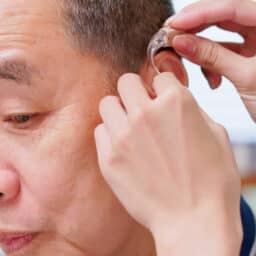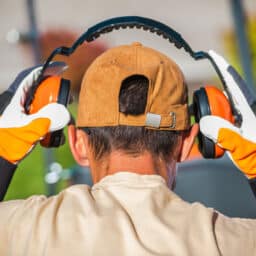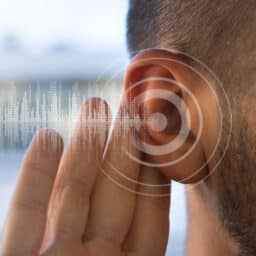Common Questions When Choosing Your First Hearing Aids

Getting your first pair of hearing aids can feel overwhelming. To help you feel prepared, here are answers to some of the most frequently asked questions by new hearing aid users. How Do Hearing Aids Work? Hearing aids have three essential components that work together to improve your hearing: What Is the Adjustment Period? When…
When Is a Cochlear Implant Necessary

If you have moderate to severe hearing loss, a cochlear implant could be a viable solution. Let’s explore what cochlear implants are and how they assist individuals who struggle with hearing but don’t find traditional hearing aids helpful. What Are Cochlear Implants? Cochlear implants are small electronic devices designed to electrically stimulate the auditory nerve,…
What Will My Life Look Like With Hearing Aids?

Living with hearing loss can be challenging, especially in today’s fast-paced world. Many might wonder, “How will hearing aids fit into my life?” or “Will they make a difference?” Part of these fears stem from a misunderstanding of how modern hearing aids work. You may have an idea in your head of cumbersome and ineffective…
How To Wear Hearing Aids With Glasses

Adjusting to new assistive devices can be challenging, especially when juggling glasses and hearing aids. If you’ve been wearing hearing aids and are now adding glasses to the mix, it’s natural to wonder how these two tools will work together comfortably. Don’t worry—you can do a few things to ensure a perfect fit. Let’s explore…
Navigating Hearing Loss as You Age: Tips for Staying Connected

Approximately one in three U.S. adults between 65 and 74 have hearing loss. Age-related hearing loss, also called presbycusis, often develops gradually. You may first notice small symptoms like missing a word or phrase here and there. Over time, your symptoms can worsen, causing massive communication breakdowns and making you feel disconnected from those around…
Protect Your Hearing: It’s Never Too Late

Hearing loss impacts more than one in ten people in the United States. This common condition can cause frustration, anxiety, depression and social withdrawal—leaving you feeling estranged from the world around you. If you have recently been diagnosed with hearing loss, whether mild or profound, it might seem tempting to neglect hearing protection, assuming it’s…
How Does Hearing Change Over Time?

Our hearing ability allows us to communicate, enjoy music and stay aware of our environment. However, as we age, our hearing naturally declines due to a condition known as presbycusis. Understanding why this happens and recognizing the signs can help manage and mitigate its effects, maintaining a better quality of life. What is Presbycusis? Presbycusis,…
How To Help Your Child Keep Track of Their Hearing Aids

Children lose everything. Their shoes, favorite blankets and homework often end up in a void of forever lost items—and hearing aids are no exception. Approximately 34 million children worldwide present with hearing loss requiring treatment or rehabilitation. If your child is among those recently diagnosed with this condition, it’s natural to worry about how they…
How Does Sleep Affect Your Hearing?

Quality sleep plays a pivotal role in maintaining overall health, influencing everything from cognitive function to cardiovascular well-being. Research has unveiled a connection between sleep quality and hearing loss, underscoring the importance of prioritizing adequate rest. Let’s explore a couple of key findings related to how sleep impacts your hearing. Sleep Duration and Hearing Loss…
Taking Control of Worsening Tinnitus: Understanding Causes and Management Techniques

Do you ever experience a persistent ringing or buzzing sensation in your ears? You’re not alone. Tinnitus affects approximately 50 million people across the United States. While for some, tinnitus might be an occasional nuisance, for others, it can significantly disrupt daily life, causing issues like sleep disturbances, anxiety and difficulty concentrating. Let’s delve into…